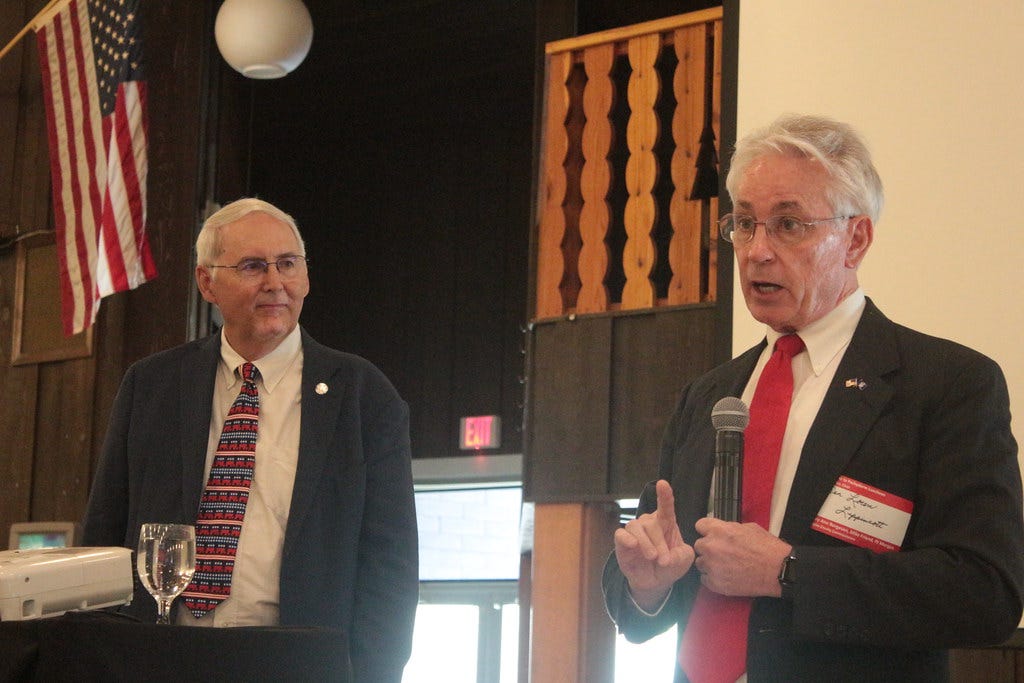Loren Lippincott and Rob Clements speak on the Filibuster, Budget Balancing, and Theatrics in the Legislature

Nebraska state senators Loren Lippincott (LD34) and Rob Clements (LD2) spoke at the Pachyderm Luncheon in Omaha on Monday, sharing highlights from another legislative session. Nebraska’s one-house state legislature is an anomaly in the United States, and while it’s nominally non-partisan, it has become rife with partisan gridlock and contentious floor debate.
Breaking through the Filibuster
Republicans hold a 33-seat supermajority in the 49-seat legislature, yet Democratic filibusters often block legislation, requiring unified Republican support for cloture votes—three times per bill—to pass significant measures. A single defector, like Merv Riepe (LD12), can derail a bill, as seen with Sen. Kathleen Kauth’s Stand with Women Act, which was watered down to gain Riepe’s support.
It wasn’t always this bad, however.
“In 2023, my first year in the legislature, [the filibuster] was used 58 times,” Lippincott said. “In 2021, … Ernie Chambers was still in the legislature, and the filibuster was used 11 times. So, the difference between 11 times and 58 times is a lot.”
Lippincott’s bill to move Nebraska’s electoral votes to a “winner take all” system had 31 votes from the legislative body, but because of the Democrats’ filibuster, cloture could not be invoked thanks to “no” votes from Merv Riepe and Dave Wordekemper (LD15). Lippincott described the bill Monday as “dead in the water.”
The rules committee will meet in January 2026 and may consider lowering the filibuster threshold from two-thirds (33 votes) to three-fifths (30), mirroring the U.S. Senate’s change in 1975. There is, however, concern about this potential shift from rural voters.
“The shift from rural to urban senator positions, they’re worried about losing more urban senators to Democrats. So there is some reluctance on that because down the road, they may only have 17 people that favor agriculture, and they would need 20 to protect themselves in the future.”
Lippincott agreed. “Douglas County has 14 state senators. Sarpy has 5 state senators. Lancaster has 9 state senators. 28 state senators out of 49 — 57% of the legislature — is Lincoln and Omaha. So what Rob says is very valid.”
Floor Shows and Balancing Budgets
Floor debates, especially during filibusters, have since become performative.
“All these people up there that are windbags talking, it doesn’t do anything,” Lippincott said. “It may impress their parents at home that are watching on TV — you know who I’m talking about — but it just doesn’t change the votes.”
Despite this, Clements achieved significant results as Appropriations Committee chair, closing a $420 million shortfall for the 2025–27 budget. This involved keeping agency funding largely flat, auditing 600 cash funds worth over $2 billion to recoup unspent balances, and tackling overpriced contracts.
“Somebody was taking care of a disabled person and getting $124 an hour,” Clements said. “Instead, let’s just hire an employee that maybe gets $30 to $40 an hour.” Much of the money was paid through contractors and did not go directly to the workers providing care. Clements found Nebraska could save money and pay individual workers more by hiring directly, as happened in the Department of Corrections.
“Through an employment agency, they had to spend $150,000 per nurse — and she doesn’t get most of that. She gets maybe $80,000,” Clements said. “The Department of Corrections told us they saved $10 million by using employee nurses … and they could pay them a little more than they were getting from that contract company by hiring them directly.”
Call for recruits
Lippincott sees recruiting principled candidates as key to overcoming legislative gridlock. “We need to actively recruit people into the legislatures,” he said, “for school districts, county commissioners, all these different things — and we need to have people that represent our different values and principles.” He also spoke on his experience knocking doors and winning voter support through the acronym LUV — to Listen, Understand, and Validate voters’ concerns.
Clements, reflecting on his own ten-year tenure in office, encouraged others to run.
“I’m from a town of 650 people … now I’ve run the state’s $5.5 billion budget, and advise the governor occasionally. It just blows my mind, being from this little small town, that anybody can do this. I encourage you to put your name out there.”



